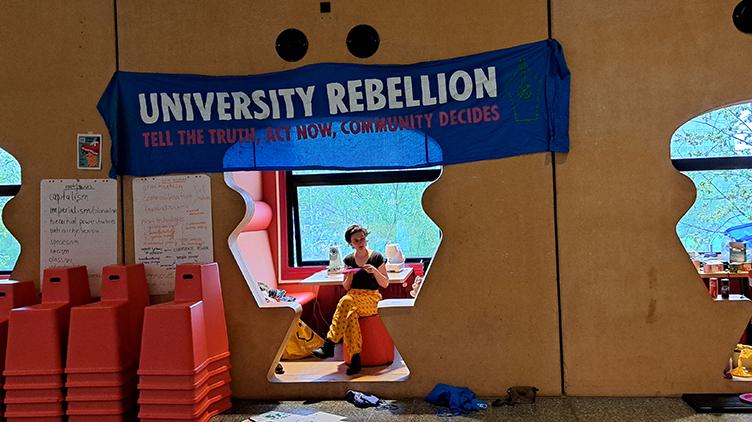New criteria to be unveiled later this year
Interim assessment of cooperation with fossil fuel industry raises questions

Earlier this month, news agency HOP reported that a research collaboration between UU and BP was being criticised (article available in Dutch only, Ed.). HOP read in a newsletter that UU professor Petra de Jongh was looking to convert household waste into fuels for industry, aviation or heavy transport, in a 1.5-million euro project in collaboration with American oil company BP.
According to the news agency, the partnership raises eyebrows given UU's statement that it would only collaborate with fossil fuel companies that are “intensively and demonstrably committed to accelerating the energy transition, in line with the Paris Climate Agreement”. HOP observes that it is questionable whether BP meets that criterion.
UU's pledge followed the occupation of the Minnaert building by students and employees for several days last year. They were protesting the university's collaboration with the fossil fuel industry.
Approval
However, HOP's article does not say whether the university has examined the collaboration with BP in light of this new policy. Anyone familiar with UU's statement would expect that to happen, but, in the article, the university justifies the approval by pointing to the expected added value of the research project in question, in terms of combating the climate crisis.
DUB investigated the matter further and discovered that De Jongh's research was one of three bilateral projects that underwent an "additional assessment" on top of the existing procedure. According to UU, this additional assessment was done because the contracts had to be concluded while a heated discussion regarding UU's partnerships with the fossil fuel industry was going on. Therefore, there was still a great deal of uncertainty at the time.
The other two research projects were collaborations with TotalEnergies focusing on the extraction of alternative fuels from CO2 and hydrogen, as well as on an environmentally-friendly way to recycle plastics. These two studies will cost approximately 1.5 million euros.
All three projects were approved. They are mentioned in an overview of ongoing collaborations with fossil fuel companies, published by UU on its website. According to the university, the additional checks analysed the content of the studies and the fossil fuel companies themselves. This was done precisely because there were doubts concerning the companies' attitude towards the targets set by the Paris Climate Agreement.
The university mentions two reasons for reaching an agreement with the two companies. First, both businesses have the necessary knowledge, infrastructure and resources to quickly implement innovations that could curb the climate crisis. UU refers to a report by the International Energy Agency (IAE). Secondly, UU cites the independent British think tank Carbon Tracker, according to which BP and TotalEnergies are among the most progressive fossil fuel companies in the world when it comes to investments in new energy sources.
New framework
It is worth noting that Carbon Tracker also concludes that none of the internationally operating fossil fuel companies currently have a policy that is fully in line with the Paris goals. UU acknowledges this.
However, the university states that "being in line with the Paris Agreement" had not yet been established as a criterion when UU started to discuss the projects. Additionally, the university has not yet determined how exactly it intends to determine whether or not a potential partner meets that criterion.
The new criteria in this regard should soon be included in an integral policy framework for all research collaborations. Once this document is ready, what UU means by “intensive and demonstrable commitment to accelerating the energy transition, in line with the Paris Climate Agreement” should become clearer.
According to the university, the framework may include more conditions than those used to assess the three projects. It is therefore uncertain if future projects with BP or TotalEnergies will proceed automatically, the spokesperson states.
The new policy framework is expected to be discussed by the University Council later this year.